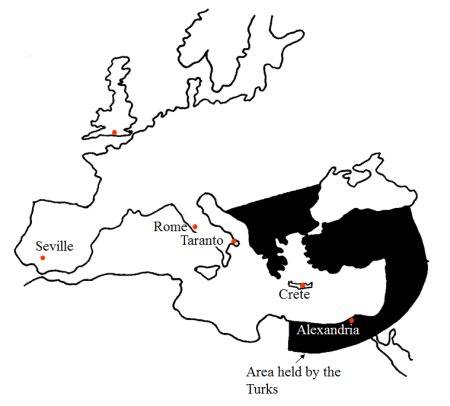John Fox (1528-1594) – A Tudor Adventurer
The Tudor period was a time when the skill and daring of English sailors was to result in the English navy ruling the seas. One such sailor was John Fox who is best described as a Tudor Adventurer. The account of his life given here is based on that given by Vincent Redstone the eminent historian who was a master at Woodbridge School.
John Fox, the son of Robert and Isabella Fox, was born at Woodbridge some time around 1528. His father, a butcher, held several premises in the town including The Crown Inn.
John Fox preferred a sea-faring life to that of a landsman, and settled for a time at Aldeburgh, trading along the coast in his ship the Mary Fortune. The vessel was captured by the Dunkirkers but re-taken by Lord Admiral Howard, and restored to Fox in 1557.
The next thing we know about him is that that, in 1563, he was gunner on board the Three Half Moons of Portsmouth bound for Seville. The Mediterranean was then a dangerous area because the countries to the west were held by the Turks who were trying to expand their Islamic empire.
Fox’s ship had scarcely entered the Mediterranean when it was attacked by the Turks. After a desperate resistance the ship was taken, and Fox, together with a few other survivors, was made a prisoner. The captives were taken to Alexandria, and at the end of fourteen years John Fox was the only member of the crew of the Three Half Moons who survived.

The places and regions mention in the text.
The skill of Fox as a barber gained him special privileges by means of which he, and seven other prisoners, contrived to gain their freedom in 1577. Arming themselves with the weapons of those they killed they freed 268 Christian captives of 16 different nations and commandeered a galley in the harbour. After a 28-day voyage, pursued by six Turkish ships and with virtually no provisions, they landed in Crete, where they were helped by monks.
The former prisoners split up, and Fox made his way to Taranto, and then on to Rome. Because he was a Christian who had confounded the Infidel, he was received by the Pope, Gregory XIV, who gave him a Letter of Passage. It read 'We on his behalf, do in the bowels of Christ, desire you that, taking compassion of his former captivity and present penury, you do not only suffer him to pass freely through all your cities and towns, but also succour him with your charitable alms; whom with tender affection of pitie we commend unto you.’.
Backed by this Papal credential, Fox entered the service of Philip of Spain, as master gunner. After two years he returned to England where he was received at Court and granted a pension of one shilling a day as a reward for his valiant action.
He returned to Aldeburgh and once more manned his old ship the Mary Fortune with a crew of twenty-five seamen to assist Lord Seymour at the time of the Spanish Armada. After the Spanish fleet had been defeated he traded up and down the coast between Blythburgh and London.
Fox died in 1594 and in his will he bequeathed the sum of £10 to be distributed among the poor of Woodbridge.
Last edited 21 Aug 23